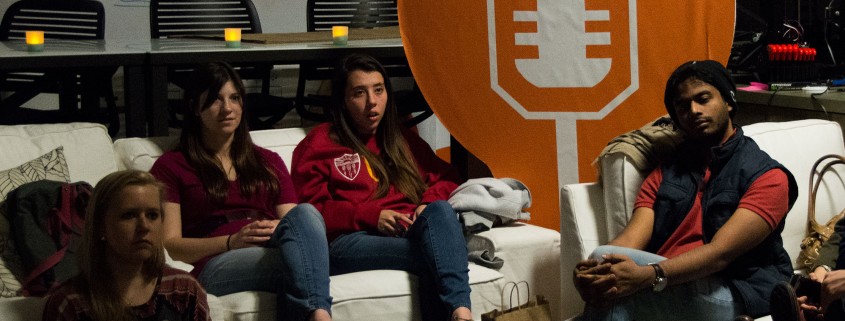Tommy Talks hosts inaugural SpeakEasy
Tommy Talks hosted the first ever SpeakEasy event in the Annenberg Innovation Lab on Thursday night, featuring speeches by students Ariel Sobel and Dylan Deluca about social issues of importance to students.
Tommy Talks had previously hosted larger speaker events, usually featuring three to four speakers who spoke for about 20 minutes each. They wanted something more relaxed and social, however, so they inaugurated the SpeakEasy series on Thursday night.
The idea behind SpeakEasy is to give students the chance to come together and share their experiences. Madisen Keavy and Anna Skelsey, the two students leading the event, wanted it to be more of an open conversation about whatever students wanted to discuss.
“We want to provide a space where [students] can talk about things that are irking and exciting to people,” Keavy said that in order to achieve this, the organizers prompted speakers and students to talk about what they were most passionate about.
Skelsey started off the event with a speed dating activity, so that all the attendees could meet each other before the speeches started. She wanted to create a sense of community, respect and trust before the conversation got going.
The event was conducted as an open forum. Ariel Sobel, a sophomore majoring in writing for screen and television, spoke about how saying “thank you” has become uncomfortable for this generation and students used this speech to strike up conversation.
“My generation has grown to fear saying ‘thank you,’” Sobel said. Her speech focused on how “thank you” has grown to encourage us to feel guilty and it makes it difficult to value ourselves. She also mentioned how it is difficult for women to have self-confidence because they always feel like they don’t deserve compliments.
“My generation of women is not entitled to feel good about themselves,” she said. “I wear makeup to conceal my flaws, not to play up the good things.”
Shane Mileham, a junior majoring in computer science, said that men experience a similar feeling, but diffuse it through jokes.
“You can’t make a joke about something that you’re good at. The jokes you make about stuff you’re good at are suddenly not funny; they are conceited,” he said.
Skelsey agreed, she thought that people are constantly putting themselves down in order to compliment someone else. To make sure that everyone knew their value, Skelsey encouraged the group to brag about the things they had done to get into USC.
One student started his first company when he was 13. Another volunteered at the soup kitchen by his house every week for his entire senior year. A student from India started a dance society in her high school within three weeks because there wasn’t one. One by one, students were asked to brag about themselves so they could realize their true value.
Sobel then concluded the talk by encouraging the students to accept that they are really good at things.
“You should not make yourself small to make other people feel bigger,” she said.
Sobel’s speech was followed by a speech by Dylan Deluca, a freshman studying communication and cinema, who talked about the moment he came out as gay in high school. Deluca talked about how he thought that coming out was a worse experience than he had imagined.
“Coming out was like being branded with a pink sparkly letter that elevated me from the level of normality to the level of novelty, a posh accessory that could be toted around like the last season’s hottest purse,” he said.
That started another group discussion, one about how people are often branded for what they do and not for what they are. “Being a blonde girl in the University of Southern California’s Greek System carries a lot of connotations, but that doesn’t define me,” Skelsey said.
Aneesha Madhok, a freshman studying theatre, was inspired by the novelty of SpeakEasy.
“It allows people to actually stand up for themselves and actually address issues that you won’t really address on a daily basis.”

